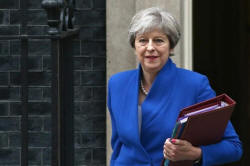|
PM May seeks to ease
Japan's Brexit fears during trade visit
 Send a link to a friend
Send a link to a friend
 [August 30, 2017]
By William James and Kiyoshi Takenaka [August 30, 2017]
By William James and Kiyoshi Takenaka
LONDON/TOKYO (Reuters) - British Prime
Minister Theresa May will look to ease corporate Japan's worries about
Brexit during a three-day visit to the country from Wednesday focused on
progress on a bilateral trade deal for when Britain leaves the European
Union.
May's first trip to Japan as prime minister comes at a difficult moment,
with Japanese attention focused on North Korea's Tuesday missile test
and Britain's Brexit negotiators recently on the receiving end of sharp
criticism from EU officials.
May will lead a 15-strong business delegation, including Standard Life
Investment <SLA.L> chief executive Keith Skeoch, and carmaker Aston
Martin's CEO Andy Palmer, pitching Britain and Japan as the "perfect
partners for the future".
She will meet Japanese Prime Minister Shinzo Abe in Kyoto before
traveling to Tokyo for an investment conference and banquet. May and Abe
are due to speak publicly on Thursday following one-to-one talks.

"My discussions with Prime Minister Abe will focus on how we can prepare
the ground for an ambitious free trade agreement after Brexit, based on
the EU-Japan agreement which I very much hope is nearing conclusion,"
May said in a statement ahead of her departure.
May will also discuss defense cooperation, describing Japan as "our
closest security partner in Asia". She will become the first European
leader to attend a meeting of Japan's National Security Council and will
also visit its flagship helicopter carrier 'Izumo' for a briefing with
military officials.
North Korea fired a ballistic missile over Japan's northern Hokkaido
island into the sea early on Tuesday, prompting warnings to residents to
take cover and drawing a sharp reaction from Abe. May also strongly
condemned the launch.
Japan's foreign ministry said the two leaders are expected to agree on
the importance of China's role in ramping up pressure on North Korea.
BREXIT EFFECT
Japan has been unusually outspoken about its concerns that Britain's
departure from the EU, which was decided by a public vote in 2016, could
affect current and future Japanese investments in Britain.
Britain is the second most important destination for Japanese investment
after the United States, with firms like Nissan <7201.T>, Toyota
<7203.T> and Hitachi <6501.T> investing billions in carmaking, energy
and transport.
During a visit to London by Abe in April, Britain said that Japanese
companies had already invested over 40 billion pounds ($52 billion) in
the British economy.
[to top of second column] |

Britain's Prime Minister Theresa May leaves Downing Street in
London, Britain July 19, 2017. REUTERS/Neil Hall

But Japan is also an important destination for British investment. Aston
Martin said on Tuesday it will open an advanced product planning office
next year in Japan to better understand the needs of Asian buyers and
tap into new technologies.
The firm is hoping to boost demand from Japan and the United States
partly as a way to mitigate against any risks from Brexit which could
add costs and delays to the 15 percent of cars it currently sells into
the European Union.
Speaking ahead of May's visit, Japanese Deputy Chief Cabinet Secretary
Yasutoshi Nishimura said Tokyo had to react to "a sense of crisis among
businesses" over Brexit, and gather information about the British
negotiating strategy.
Britain has published a series of papers setting out how it wants to
settle its divorce with the EU, and is pushing for talks to move on to
discuss the future relationship between the two - something of critical
importance to investors.
But European Commission President Jean-Claude Juncker insisted on
Tuesday that the new relationship could not be discussed until initial
differences had been resolved, and the EU's chief negotiator Michel
Barnier said on Monday he was concerned at the slow progress made so
far.
Japan's foreign ministry said Abe is expected to ask May to maintain
transparency and predictability regarding Brexit so that any impact on
corporate activity will be minimized - echoing concerns Abe expressed in
April about a Brexit cliff-edge.

May's spokeswoman said the prime minister would reiterate Britain's
position that it is seeking to agree a time-limited Brexit transition
period after March 2019 to avoid a sudden change in trading and
regulatory conditions for businesses.
"What they will discuss in private I can't pre-empt, but that is our
position and she'll be setting that out if he (Abe) asks," the
spokeswoman said.
($1 = 0.7724 pounds)
(Additional reporting by Costas Pitas; Editing by Hugh Lawson)
[© 2017 Thomson Reuters. All rights
reserved.] Copyright 2017 Reuters. All rights reserved. This material may not be published,
broadcast, rewritten or redistributed. |